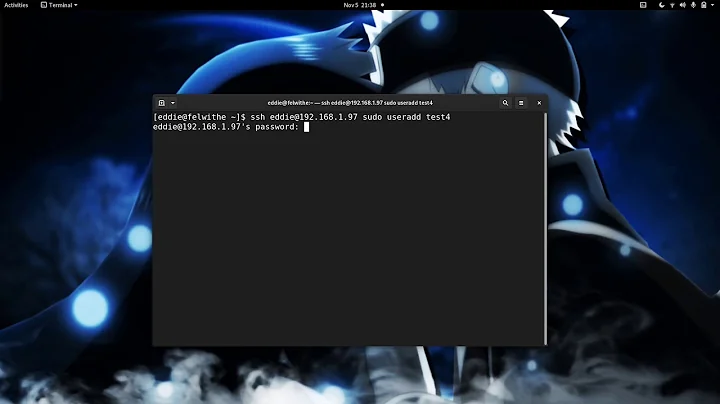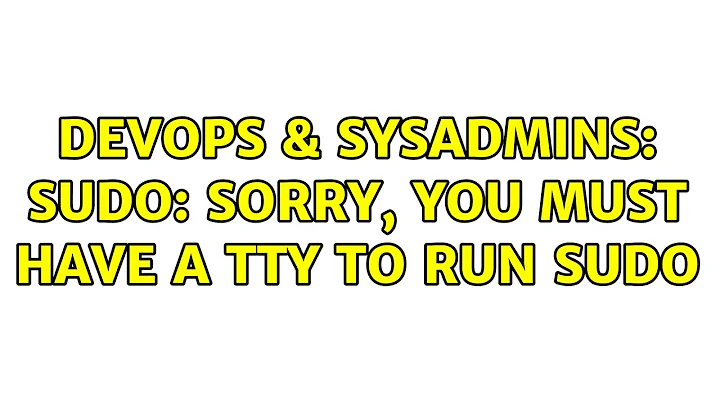"sudo: sorry, you must have a tty to run sudo" when using sudo in a remote script
With the first one there is no tty for ssh since stdin is not connected to the terminal, it is a here file. In fact if I try to run a similar command (on Debian) I get the following error:
Pseudo-terminal will not be allocated because stdin is not a terminal.
To get it to work you can do something like:
ssh -tt 192.168.1.100 <<EOF
sudo -S id
password
EOF
Although this is not a good idea since the password will be in plain text.
Update
I stumbled across an easy solution to this that avoids encoding the password in plain text, you can use a graphical program to enter the password:
ssh -X 192.168.1.100 <<EOF
SUDO_ASKPASS=/usr/lib/ssh/x11-ssh-askpass sudo -A id
EOF
Of course the ssh-askpass program must be installed in the given location and you must be running an X session on the machine you are working on. There are a few variations on the ssh-askpass program which should also work (Gnome/KDE versions). Also a graphical sudo replacement program like gksu or kdesudo should do the job too.
Related videos on Youtube
Kumar
Updated on September 18, 2022Comments
-
Kumar over 1 year
I am trying to write Observe pattern in Java in multithread program to develop own logging program. My program is used in any Java class and can create the
Loggerclass, and write a message to the logger. Logger class will call the logger manager class , which is a Singleton class and it also have the private class which is thread, on execution a scheduler runs, So I kept that execution in the private constructor.private void LoggerManager() { System.out.println("IN CONSTRUCTOR"); executorThread.submit(new CreateLoggerFileForSpecifiedTime()); } static LoggerManager getInstance() { if (LOGMANAGER == null) { synchronized (LoggerManager.class) { if(LOGMANAGER == null){ System.out.println("IN MANAGER"); LOGMANAGER = new LoggerManager(); } } } return LOGMANAGER; }Next there is a method in the LoogerManager "writeMessageToLog".
void writeMessageToLog(String componantName, String message, Calendar messageCreationTime) { LoggerDetails logDetails = new LoggerDetails(componantName, message, messageCreationTime); LogInitiater logIntiater = new LogInitiater(logDetails, noticeOfLoggerChange, noticeOfMessageAdded); executorThread.submit(logIntiater); }LogIntitiateris a thread which is added the LogWriter to two Subject's, One subject is a scheduler I have pasted above i.e a Timer runs for every specified time and notfiiesLogWriterthe need to create a new log file while the other purpose is when a message is added in the queue. Code is not working as expected: * scheduler code is not running, I tried withexecuteas well. That private constructor is not being called * thread initiater is not always called * observe pattern: I have used J2SE interfaces i.eObservableandObserveand they are not working as expectedPlease help me.
-
Kumar over 11 yearsI accepted all the answer which resolved my question. How can I accept the answer without solving my problem
-
Narendra Pathai over 11 yearsfine I was just saying. By the way are you trying to make Logger asynchronous here?
-
Kumar over 11 yearsYa, Yes you are correct. Is there any other solution. Please let me know
-
 Isuru Gunasekara almost 10 yearsI can't change the /etc/sudoers to remove the requiretty and I'm required to use a password to elevate with sudo.
Isuru Gunasekara almost 10 yearsI can't change the /etc/sudoers to remove the requiretty and I'm required to use a password to elevate with sudo. -
 Isuru Gunasekara almost 10 yearsalso, I am already using the -t option on my ssh, it just that the embedded script within the EOF tags isn't respecting the forced tty
Isuru Gunasekara almost 10 yearsalso, I am already using the -t option on my ssh, it just that the embedded script within the EOF tags isn't respecting the forced tty
-
-
Kumar over 11 yearsAbove solution works fine on stand alone. But I need aditional task as well, Need to write the message in the log file. And Every 10 minutes I need to change the log file as well. And Message should be in the Order of the request comes, and nothing should be stooped at the file creation time.
-
Narendra Pathai over 11 yearsyes :) but there are some cases like queue full that I have not handelled
-
Kumar over 11 yearsThank you Narendra, it worked, I have added your classes to root of my classes , it started working. Thank you very much for your help
-
Narendra Pathai over 11 yearsThat's what we are here to do :) Glad I could help you @Kumar
-
 Isuru Gunasekara almost 10 yearsThat doesn't work for me either. I get tcgetattr: Inappropriate ioctl for device
Isuru Gunasekara almost 10 yearsThat doesn't work for me either. I get tcgetattr: Inappropriate ioctl for device -
Graeme almost 10 years@Andy, yes, it will since there is no actual terminal but
sudostill tries to read the password form it. It is possible to use-Sto make it read the password fromstdin(not recommended though), see my edit. -
 Isuru Gunasekara almost 10 yearsIt also outputs the password in clear text and still doesn't run the command.
Isuru Gunasekara almost 10 yearsIt also outputs the password in clear text and still doesn't run the command. -
Graeme almost 10 years@Andy, I had the same effect, yes. It did run the command though.
-
 Isuru Gunasekara almost 10 yearsThe answer suggested at serverfault.com/questions/479553/… works for a simple command (like sudo id), but for my more complex scripts, it doesn't interpret correctly.
Isuru Gunasekara almost 10 yearsThe answer suggested at serverfault.com/questions/479553/… works for a simple command (like sudo id), but for my more complex scripts, it doesn't interpret correctly. -
 Isuru Gunasekara almost 10 yearsDisplaying the password in clear text either in the script or in the stdout doesn't work for me. I'm fine with it prompting me for my password again to elevate my priveleges "[sudo] password for user:"
Isuru Gunasekara almost 10 yearsDisplaying the password in clear text either in the script or in the stdout doesn't work for me. I'm fine with it prompting me for my password again to elevate my priveleges "[sudo] password for user:" -
Graeme almost 10 years@Andy, for this I was just trying to show why the here file approach wasn't working and why it isn't really a good idea anyway. I can't suggest a better solution without knowing more about what you are trying to do. Although you can also have something like
ssh -t host 'sudo id; echo "non-root command"; sudo echo "another root command"'in addition to usingbash -c. The trick is usually just to make sure things are correctly quoted. -
 Isuru Gunasekara almost 10 yearsI understand. Thanks for the suggestion. My script was already written to use ssh root@host, but they took root access away and forced me to use sudo. so I'm trying to substitute in the sudo commands for a variety of system checks. simple things, like looking for certain users in the /etc/sudoers file. Most of the script runs fine as myself, but for those few places I need to escalate, I have to use sudo.
Isuru Gunasekara almost 10 yearsI understand. Thanks for the suggestion. My script was already written to use ssh root@host, but they took root access away and forced me to use sudo. so I'm trying to substitute in the sudo commands for a variety of system checks. simple things, like looking for certain users in the /etc/sudoers file. Most of the script runs fine as myself, but for those few places I need to escalate, I have to use sudo. -
Graeme almost 10 years@Andy, updated with a possible way to work around this.




